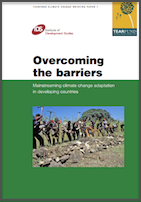Overcoming the barriers: Mainstreaming climate change adaptation in developing countries


Executive Summary
Climate change is a huge threat to all aspects of human development and achievement of the Millennium Development Goals for poverty reduction. Until recently, donor agencies, national and local layers of government, and non-governmental organisations have paid little attention to the risks and uncertainties associated with climate change.
Now, however, players at all levels are increasingly engaging with the question of how to tackle the impacts of climate change on development in poorer nations. There are growing efforts to reduce negative impacts and seize opportunities by integrating climate change adaptation into development planning, programmes and budgeting, a process known as mainstreaming. Such a co-ordinated, integrated approach to adaptation is imperative in order to deal with the scale and urgency of dealing with climate change impacts.
In developed countries progress on mainstreaming climate adaptation has been limited. Many countries have carried out climate change projections and impact assessments, but few have started consultation processes to look at adaptation options and identify policy responses.
In developing countries, the mainstreaming process is also in its early stages. Small island developing states have made good progress, with Caribbean countries among the first to start work on adaptation. The Pacific islands have received considerable support and through the World Bank a number of initiatives have begun.
Crucially, there has been little progress in mainstreaming adaptation within existing poverty alleviation policy frameworks. There is a lack of research on the extent to which climate change, and environmental issues more broadly, have been integrated within PRSPs. This is critical. Examples of efforts from Sri Lanka, Bangladesh,Tanzania, Uganda, Sudan, Mexico and Kenya are presented, highlighting a number of key issues relating to current experiences of integrating climate change into poverty reduction efforts.
Experiences so far highlight a number of barriers and opportunities to mainstreaming climate change adaptation in developing countries. These are focused around information, institutions, inclusion, incentives and international finance, and result in a number of recommendations for national governments and donors.
Suggested Citation
Mitchell, T., Tanner, T., Wilkinson, E., 2006. Overcoming the barriers: Mainstreaming climate change adaptation in developing countries. Tearfund Climate Change Briefing Paper 1.
(0) Comments
There is no content